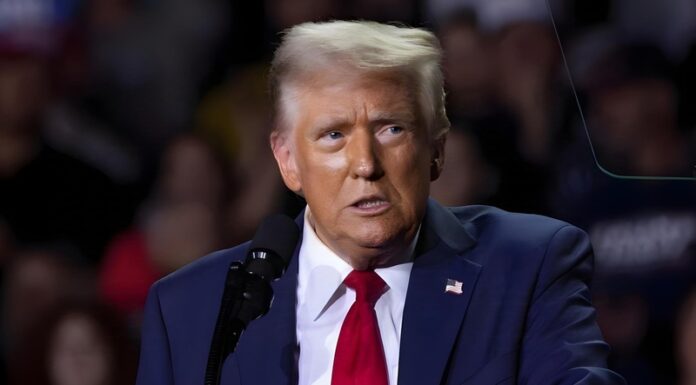President Donald Trump has once again come under scrutiny for making statements perceived as supportive of authoritarian leadership styles, as various reports have noted in recent weeks. These comments have sparked discussions among experts who view them as part of a strategy to normalize such rhetoric.
During a press conference on Monday, August 26, 2025, Trump addressed criticism regarding his governance methods. Responding to reactions over his threats to send troops into U.S. cities, he mentioned that critics label him a dictator, adding, “A lot of people are saying maybe we’d like a dictator.” Trump emphasized that he does not favor dictators, describing himself as possessing great common sense.
The next day, on Tuesday, August 27, 2025, Trump reiterated similar ideas during a cabinet meeting attended by reporters. He claimed without evidence that Maryland Governor Wes Moore privately praised him but publicly criticized him as a dictator. Trump argued that being labeled a dictator who reduces crime might not be an issue, suggesting many people would support such leadership if it lowered crime rates.
These remarks come amid Trump’s broader campaign promises to take action against political adversaries, which he has reportedly pursued since assuming office. The administration has launched investigations into several Democratic figures, including New York Attorney General Letitia James, California Senator Adam Schiff, and former New York Governor Andrew Cuomo.
Federal authorities have also scrutinized former Trump administration officials who became critics. The FBI searched the residence and office of John Bolton, Trump’s former national security adviser, on Friday, August 22, 2025. Bolton had recently referred to the current administration as “the retribution presidency.” Additionally, the Justice Department has directed prosecutors to investigate Miles Taylor, who authored a book cautioning about Trump’s authoritarian tendencies, and Chris Krebs, who affirmed the security of the 2020 election.
Trump has simultaneously expanded federal authority in new ways. On Monday, August 11, 2025, he announced the placement of the Washington, D.C. police under federal oversight and the deployment of around 800 National Guard troops to the capital. This was the first instance of a president invoking the District’s Home Rule Act since its inception in 1973.
The president described the move as “liberation day in D.C.” and claimed the capital was “overtaken by violent gangs and bloodthirsty criminals.” However, police statistics show that crime rates in Washington, D.C. have decreased this year, contradicting Trump’s portrayal of increasing violence.
Trump indicated plans to extend similar federal interventions to other major cities. On Friday, August 22, 2025, he informed reporters that Chicago would likely be the next target of his crackdown efforts, followed by New York. He described Chicago as a “mess” and claimed residents are requesting federal intervention, despite significant reductions in violent crimes in the city.
The administration’s strategy extends beyond law enforcement to healthcare policy. Trump has instructed his administration to examine what he describes as threats to children posed by common psychiatric medications. Through an executive order issued on Thursday, September 11, 2025, he established a “Make America Healthy Again” commission led by Health and Human Services Secretary Robert F. Kennedy Jr.
The order mandates the commission to create an assessment within 100 days, analyzing “the prevalence of and threat posed by the prescription of selective serotonin reuptake inhibitors, antipsychotics, mood stabilizers, stimulants, and weight-loss drugs.” This directive targets medications used by millions of Americans during what experts identify as a mental health crisis among children and teenagers.
Some Republican senators have voiced concerns over Trump’s actions. When the president dismissed Erika McEntarfer as commissioner of the Bureau of Labor Statistics on Friday, August 2, 2025, due to disappointing job numbers, Senator Thom Tillis of North Carolina remarked that if she was fired simply because officials disliked the economic data, “they ought to grow up.”
Senator Cynthia Lummis of Wyoming described the decision to remove McEntarfer before verifying the accuracy of employment figures as “kind of impetuous.” Senator Rand Paul of Kentucky expressed concerns about politicizing government data, noting that objective statistics become less reliable when those providing them face termination for unfavorable results.
The administration has also positioned itself as what one report called America’s first “suer-in-chief.” Trump has been leveraging executive powers and legal pressure to compel institutions to align with his ideological views. In July 2025, Columbia University agreed to pay the U.S. Treasury over $200 million over three years, while implementing stricter oversight of international students, following the administration’s freeze on most of the school’s federal research funding.
This pattern of statements and actions has led observers to point out what they see as a deliberate effort to normalize authoritarian rhetoric and expand presidential power beyond traditional boundaries. Critics argue that the repeated references to dictatorial leadership, along with unprecedented federal interventions and investigations of political opponents, signify a significant shift from established democratic norms.
According to recent reports from September 2025, President Trump has been publicly urging Attorney General Pam Bondi to prosecute his political opponents, posting on Truth Social that “We can’t delay any longer, it’s killing our reputation and credibility” and specifically naming former FBI Director James Comey, Senator Adam Schiff, and New York Attorney General Letitia James as targets.
These efforts have coincided with Trump dismissing a U.S. attorney who resisted pursuing such cases, while the administration has collaborated with officials like William Pulte at the Federal Housing Finance Agency to generate criminal referrals against Democratic officials based on what critics describe as insubstantial grounds.
Democrats have described these demands as threats to American democracy, with some labeling them “a path to dictatorship,” while legal analysts and commentators have warned that Trump’s public calls for prosecuting political adversaries represent a major departure from constitutional governance and democratic norms.








